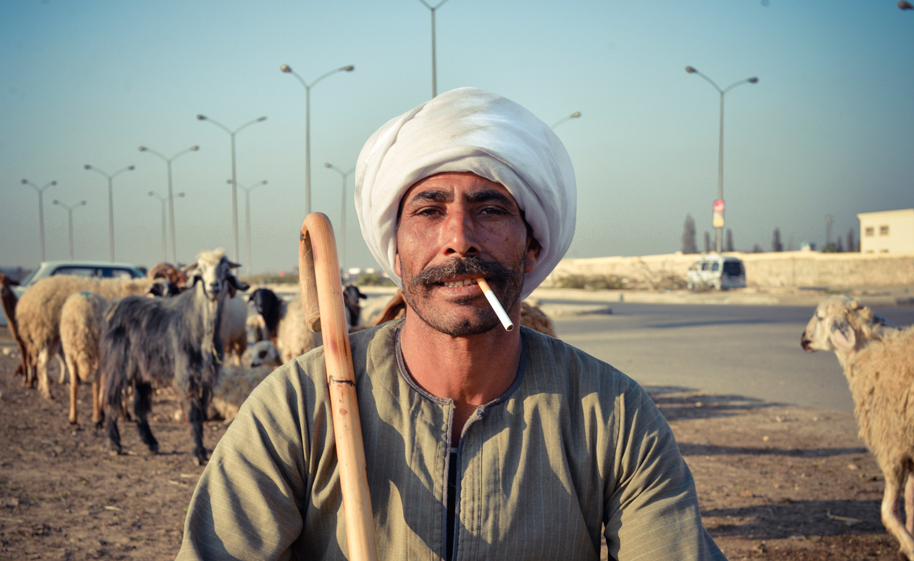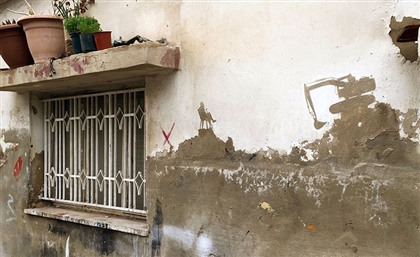Lessons From An Egyptian Shepherd
Somewhere between travel chronicles and journalism, Valentina Primo is drawn to the story of a 6th of October urban shepherd, an ineffable man whose words deeply resonate with the collective cry of a society fallen to lethargy.

His wrinkles stream down his sun-trodden face, his skin tamed by 40 years of unforgivably early mornings and slapping winds. An ineffably royal moustache hangs at the ends of his mouth as a witty, mischievous grin anticipates the inevitable icebreaker. “Oh, but you look younger!” I utter, to his casual smirk. He tosses a few leaves on the ground for the sheep gathered around him, nonchalantly guiding them with a chirping sound - one that echoes an ancient ritual fallen into the collective imagination of a backwards, dawdling rural life. But we are in the middle of a city.
I remember the first time I saw him. It was January 2013 and I had just begun my search for a house, a job, and a life in Cairo. The winter was unusually chilly and the roller coaster rides on crammed microbuses on the highway to 6th of October made for a thrilling daily commute. That day, the microbus was empty, so I sat in the middle, behind a one-toothed driver that kept tilting his head right and left to the sound of a rusty stereo song. A grin stretched across his face. As we reached the imaginary boundaries of 6th of October City, I saw them. A flock of sheep scattered along a deserted corner were grazing in an inexistent field, framing a spontaneous sitting room set in an empty lot of land. At its heart - sitting on the dusty mat that presides the area, a cup of tea in his hand - Amr watched us and waved. It was the first time for me to see Egypt’s urban sheep.

This time, as I see him acrobatically waving his hands high up in the air, I can’t help getting out of the car. He grabs a pile of herbs and comes to greet us. His approach is the unprompted show of a man who knows his trade. He speaks loudly. His hands constantly gesture. He smiles a lot. He is wearing a faded green galabeya, crowned with a pristine white turban masterfully wrapped around his head. As he chirps in a non-casual display of artfulness, his lips crease around his mouth and expose his cigarette-tinted teeth. He doesn’t limp, but he uses a wooden shepherd's crook to walk.
Amr sells each sheep for around 1,000 LE to 1,500 LE, but as he does not own them, he only earns a commission that allows him to support his wife and four children who live in a house far away from the dust-covered lot. Today, he herds a pack of 20 sheep, “but the number varies from time to time,” he says as he points to the ram hastily gathering around his stack of herbs. “Their owner trusts me and asks me to feed them and sell them. If I don’t take good care of them, I’ll be out of a job,” he comments. There is no shed, no wire or fence - just the controlling eye of Amr and his unforgettable chirping sound.

At night, when he goes home to sleep, the sheep are locked in an enclosure at the back of the yard until the break of dawn, when Amr arrives to his improvised workspace and begins the herding routine. If he runs out of sheep to sell, he rents a car and heads to the souq where he buys more animals in order to trade their meat and fur. “Thank God, for this. I’m happy. I have no other source of earning a living,” he says, with a dash of humorous attitude tossed on the side. “If God sends something my way, great! If not, then I just say Alhamdulillah.”
Among the hasty sheep gathered around him to eat are two black-and-white curly-haired lambs. “These two are my favourites. Because they’re young, I’ve had them since they were tiny,” he says. But there is no name to call them by. “Naming animals is haram. I can’t give him a human name when he is an animal. We can’t place both beings on the same level,” he explains with a frown.

Facing the road where our car is parked is an arch made up of wooden sticks graciously framed by rubber wheels and animal fur, greeting passers-by. It looks like the entrance to the land of another time. Amr grabs the crook and spontaneously poses for a picture. His pride is almost enviable. But life's hurdles abound for this man, who arrives at the break of dawn every day to wait for customers who buy his sheep.
His house, far away from the land where he herds, has a monthly rent of 1,000 LE, which requires an extra 500 LE to pay for electricity, water, and gas. In the good months, he earns about 1,900 LE; but, in slender times, the amount can go down to 1,000 LE, he says. His elder son, who is 18 years old, often assists his father in the trade to help send his brother and two sisters to school. “Life is hard, and I feel that I’m giving more than I get. If I want a galabeya like the one I am wearing, and I only have 100 LE, it is not enough! I have to get my children food, first, and other important things,” he explains. “But here I am, sitting in the desert. Would you like some tea?” he charmingly interrupts the talk.

The land where we are standing, surrounded by low-income houses on one side and modern, colourful buildings on the other, belongs to Hajj Tawfik, who runs a school a few metres away. Using the location did not require official permission but a goodwill agreement with the owner, the police station, and the school nearby. “I spoke to him and he allowed me to guard the place. We don’t want to cause problems or trouble for anyone, we just want to live in peace and do our jobs,” he casually says, as if it was not the first time he is asked about the place.
The story of his path to shepherding is the inspirational tale of an unwittingly self-made entrepreneur who found a way through goodwill and a dose of charisma. “I became a shepherd many years ago,” he narrates. “I didn’t find any job on the market and I had kids that I needed to feed. God sent me this owner who brought them to me; God bless his soul. Then I spoke to the landlord and we agreed that, as long as I keep people from dumping trash here, I can use it for my sheep.”
With captivating cheerfulness, Amr confesses that he considers his story an example for young Egyptians. “Our youth are not good. If God gave one of them 100 LE nowadays, they could so easily go and spend it on some pills, hashish, etc. Why?! Go buy some meat and bread and you’ll be great!” he says. “If I could advise them, I would tell them to go and work in anything they find to feed themselves; to stay away from that kind of poisonous, detrimental life.”
Photography by Ahmed Najeeb.
Translation by Amgad Abdelhady.
























